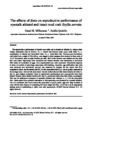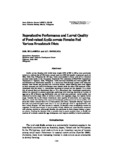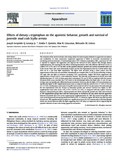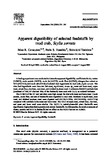The effects of diets on reproductive performance of eyestalk ablated and intact mud crab Scylla serrata

ดู/เปิด
Request this document
วันที่
2000Page views
389เมตาดาต้า
แสดงระเบียนรายการเต็มCited times in Scopus
101 readers on Mendeley
- Citations
- CrossRef - Citation Indexes: 47
- Policy Citation - Policy Citations: 4
- Scopus - Citation Indexes: 67
- Captures
- Mendeley - Readers: 101
- Social Media
- Facebook - Shares, Likes & Comments: 12
Share
นามธรรม
The reproductive performance of female mud crabs was evaluated as affected by various diets. Dietary treatments were as follows: D1 — natural diet (mussel meat, squid, trash fish); D2 — combination of natural and formulated diets; D3 — formulated diet. Pond-sourced broodstock, with initial body weight of 300–400 g, were tagged in their carapace then stocked in three units of 10 m3 broodstock tanks at eight females per tank. Half of the females were ablated and the other half were intact. Spawnings were monitored and berried females were transferred to individual 500-l tanks for incubation of eggs. Four experimental runs were conducted. Broodstock response in terms of number of spawnings, spawnings with hatching, fecundity, egg fertilization rate, total zoea produced and broodstock survival was enhanced in females fed the mixed diet (D2) compared to those fed the natural diet (D1) or the formulated diet (D3). Larval quality measured as larval stage index followed the same trend. Results further showed that intact females fed diets D1 and D2 gave higher numerical values in reproductive performance and zoea growth index than ablated females while ablated females fed diet D3 performed better than their intact counterparts. This may be attributed to presence of essential nutrients and vitamins A, C, E in the formulated diet. Latent period from gonadal maturation to first spawning was shortened by eyestalk ablation. Use of a combined diet would ensure the production of good quality eggs and large numbers of zoea with the best chance of completing the larval stages and thus, would serve as an appropriate starting point in establishing a viable mud crab aquaculture.
การอ้างอิง
Millamena, O. M., & Quinitio, E. (2000). The effects of diets on reproductive performance of eyestalk ablated and intact mud crab Scylla serrata. Aquaculture , 181(1-2), 81-90. https://doi.org/10.1016/S0044-8486(99)00214-8
เรื่อง
Taxonomic term
คอลเลกชัน
- AQD Journal Articles [1243]
รายการที่เกี่ยวข้อง
แสดงรายการที่เกี่ยวข้องตามชื่อผู้แต่งผู้สร้างและเรื่อง
-
Reproductive performance and larval quality of pond-raised Scylla serrata females fed various broodstock diets
Millamena, Oseni M.; Bangcaya, Josette B. (Asian Fisheries Society, 2001)Scylla serrata females with initial body weight (BW) of 350 to 400 g were previously raised on a defined diet of 75% brown mussel meat and 25% fish bycatch in grow-out ponds at Molo, Iloilo City, Philippines for 120 days. ... -
Effects of dietary l-tryptophan on the agonistic behavior, growth and survival of juvenile mud crab Scylla serrata
Laranja, Joseph Leopoldo Q., Jr.; Quinitio, Emilia T.; Catacutan, Mae R.; Coloso, Relicardo M. (Elsevier, 2010)The reduction of the survival of mud crab during culture has been largely attributed to aggressive encounters and cannibalism. In some crustaceans, suppressed aggression is linked to increased concentration of circulating ... -
Apparent digestibility of selected feedstuffs by mud crab, Scylla serrata
Catacutan, Mae R.; Eusebio, Perla S.; Teshima, Shin-ichi (Elsevier, 2003)A feeding experiment was conducted to determine apparent digestibility coefficients for dry matter (ADMD), crude protein (ACPD), crude fat (ACFD), crude fiber (ACFbD), nitrogen-free extract or NFE (ANFED), and crude ash ...






